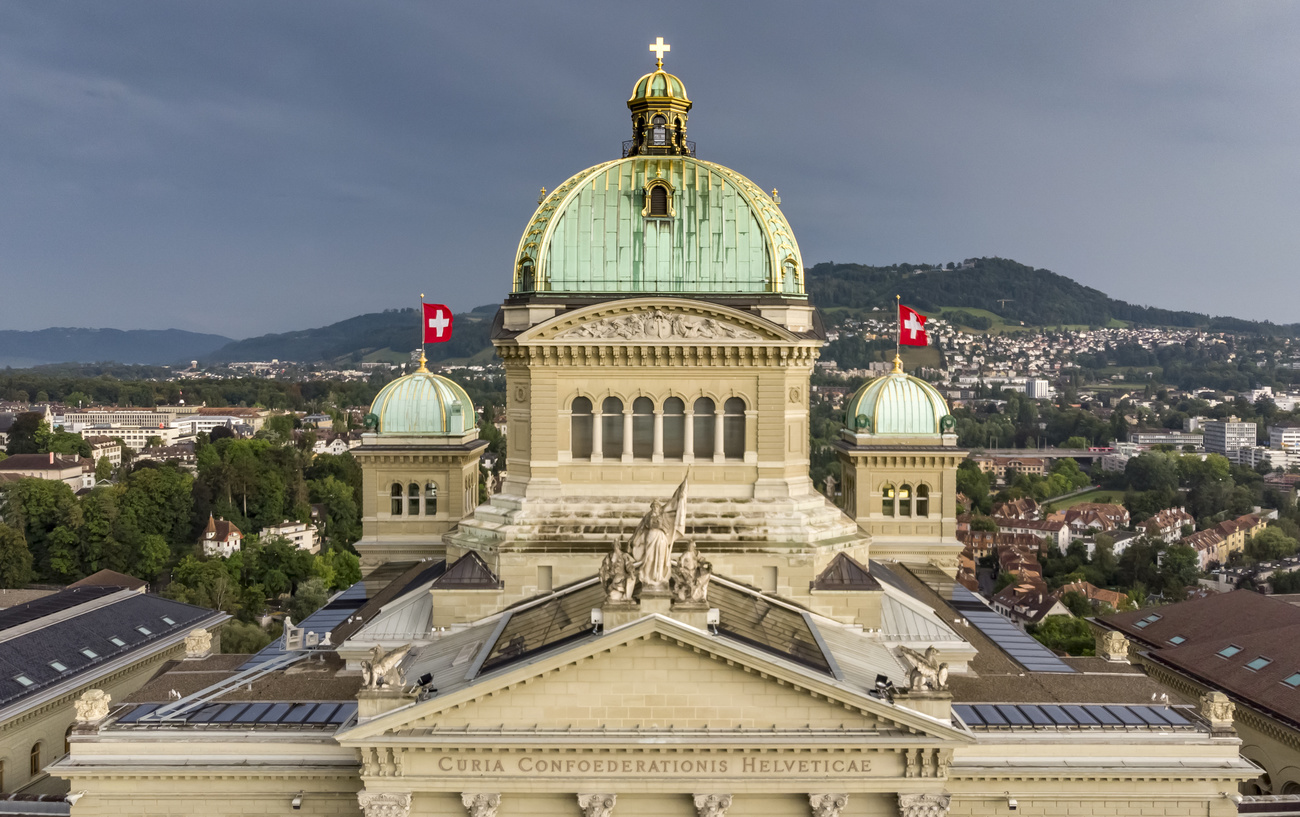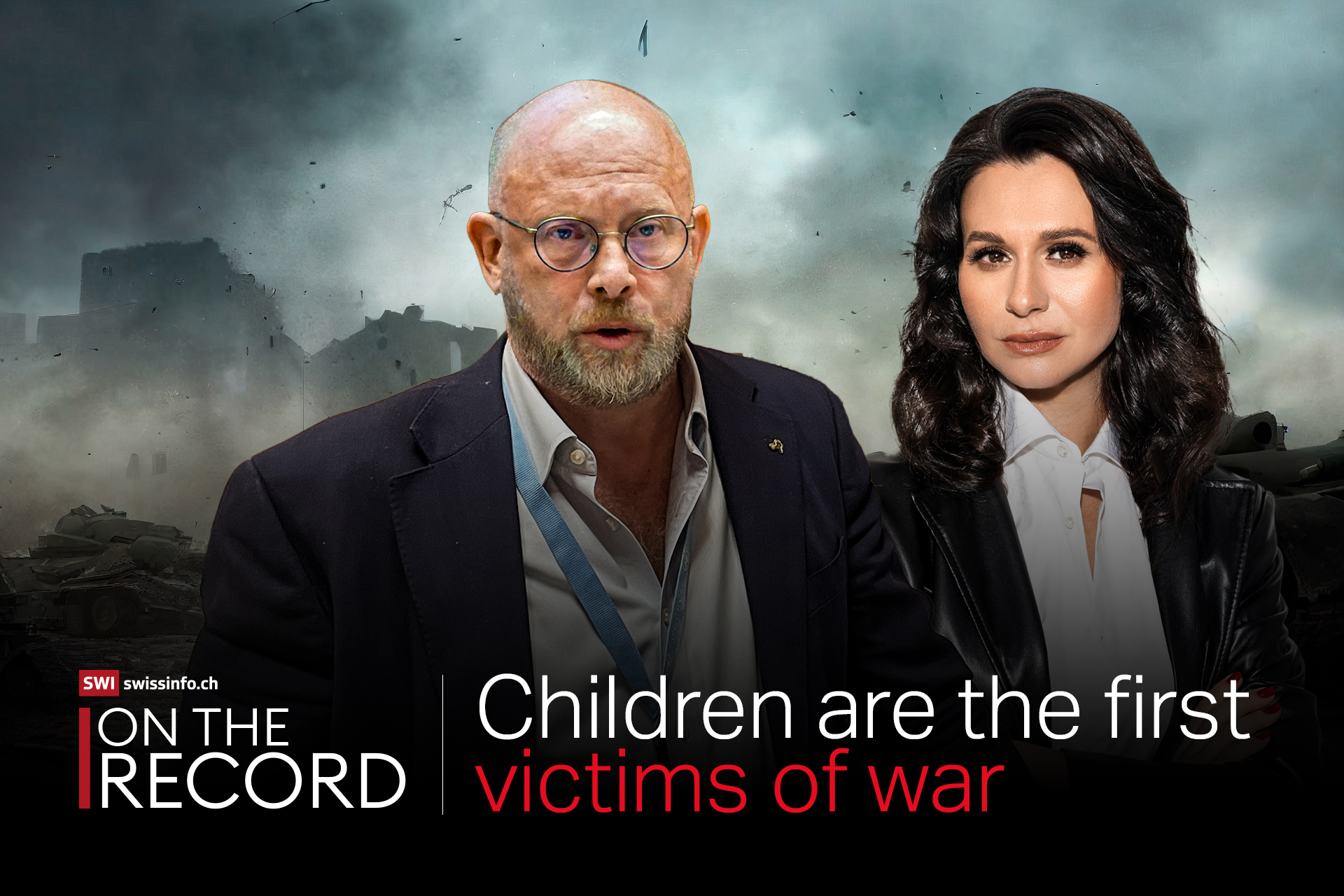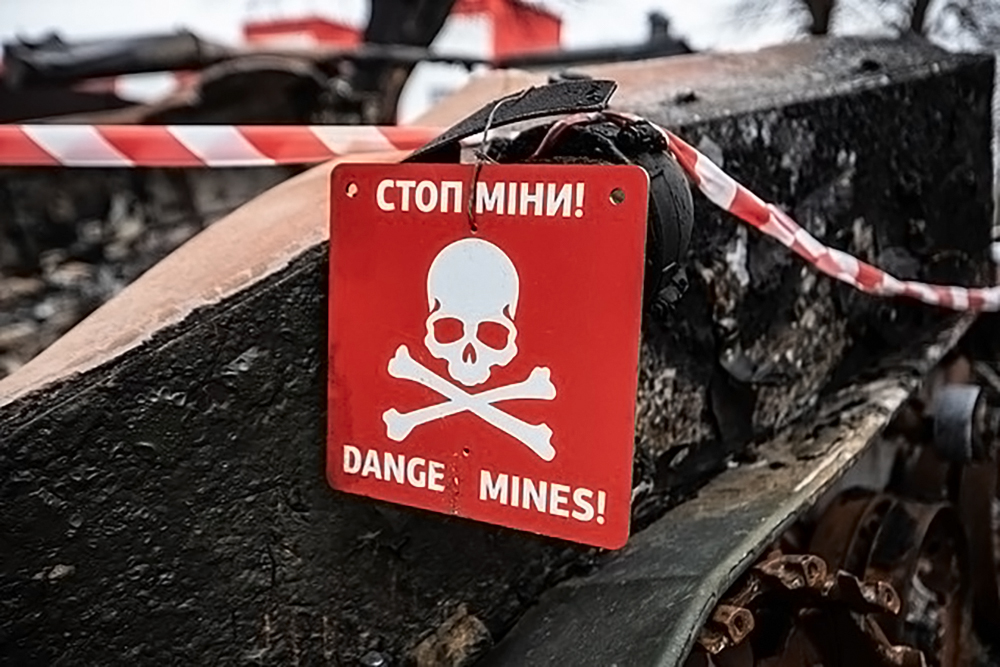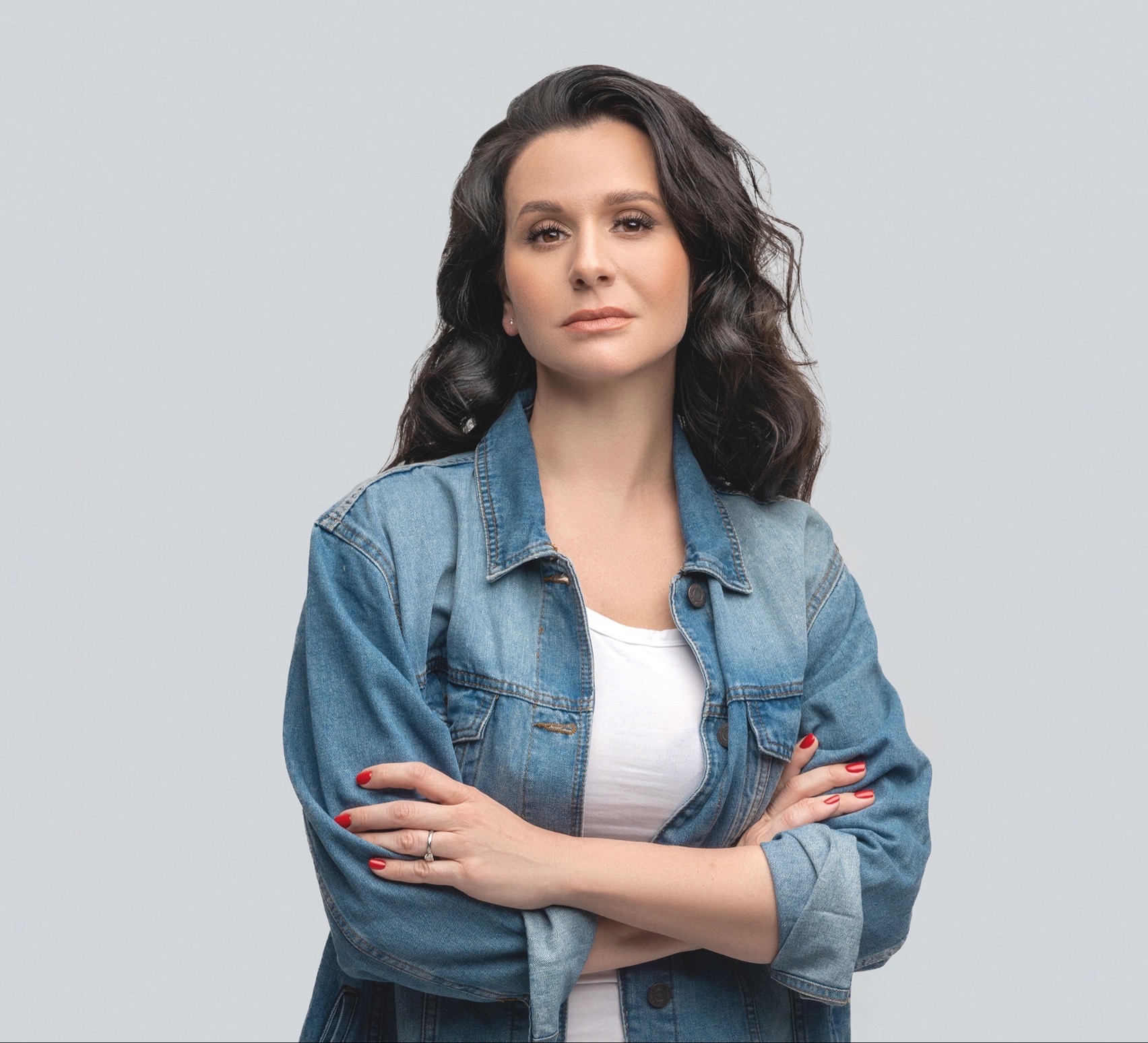‘Room for more action by Switzerland,’ says Ukrainian foreign minister

In an exclusive interview with SWI swissinfo.ch, Ukrainian Foreign Minister Dmytro Kuleba discusses the upcoming peace conference to be held in Switzerland, negotiating with Russia, and repatriating orphans to Ukraine.
SWI: Swiss authorities have frozen Russian assets under sanctions. What do you think should happen with these assets in Switzerland, without violating private property?
Dmytro Kuleba:We understand how unlikely it is that Russia will voluntarily agree to pay for the damage caused by the war. Therefore the world’s democratic countries are working on creating a universal compensation mechanism.
As it stands, we argue that assets blocked by partner states as part of sanctions should be used to fund compensation. These are both sovereign assets of a state that violates international law, as well as those from individuals who support the aggressor’s actions.
I would like to emphasise that current international law provides a necessary legal basis for seizing frozen Russian assets. For instance, the 2001 UN Articles on Responsibility of States for Internationally Wrongful Acts allow such a countermeasure in response to aggression. Leading international experts in this field have also confirmed the legality of such action.
We appreciate Switzerland’s consistent sanctions policy. According to our information, Switzerland has blocked around $15 billion (CHF13.6 billion) in Russian assets, both private and sovereign. We already have the example of Belgium of using interest income from frozen assets. This could be the first step for Switzerland as well. Ultimately, we ask that that all confiscated Russian frozen assets be used.

More
Russia sanctions: Switzerland must do more, says committee
Currently, Switzerland has frozen CHF7.5 billion ($8.2 billion) of assets from sanctioned Russian individuals, accounting for only 5% of the estimated CHF150 billion of total Russian assets in the country. We believe there is room for more action by Switzerland. Such action will send the message that aggression is unacceptable and that everyone must follow the rules. This will act as a powerful deterrent to any country tempted to launch an armed aggression.
SWI: Is the return of the 65,000 Ukrainian refugees in Switzerland conceivable? What conditions have to be met?
D.K: Russia’s large-scale aggression against Ukraine resulted in the temporary displacement of millions of Ukrainian citizens, primarily women, children and the elderly.
We are grateful to all our foreign partners, including Switzerland, for their efficient state-level cooperation in assisting Ukrainians abroad. This includes adapting internal procedures, simplifying migration rules, providing financial and medical assistance and resolving issues of temporary accommodation.

More
Ukrainians in Switzerland: what’s next after two years of protection?
One of the reasons we’re asking partners to provide Ukraine with additional air defence capabilities is that it will improve protection for our cities and encourage people to return. This, in turn, will strengthen Ukraine’s economy and make our country more self-sufficient and reduce our reliance on foreign aid.
SWI: In the early days of the war, children of the Mariupol orphanage were evacuated to Switzerland. Today, many Ukrainian children are abroad. These are not only children who left with their parents, but also orphans and children without parental care. Do think they will be able to return to Ukraine?
D.K: Millions of young Ukrainians have been displaced. Data from the beginning of the war to mid-March show that the Russian army has killed 535 Ukrainian children and injured 1,254 others. Only recently a single Russian drone strike on a residential building in Odesa killed five children. Mark, three years old, Tymofiy, four months old, Liza, seven months old, with her parents Oleh and Tetyana, Serhiy, ten, and his seven-year-old sister Zlata.

More
Child victims in Ukraine – can the trauma be cured?
Russians also kidnap Ukrainian children in occupied territories, forcibly transfer them to Russia, tell them their parents abandoned them, and place them with Russian families for adoption and “re-education”. We know of at least 20,000 children who have been forcibly transferred. We work tirelessly to save our children, reunite families, and help them in any way we can. We welcome all international efforts to assist them and return those who have been forcibly deported to Russia. We are grateful to Switzerland for welcoming children from the Mariupol orphanage.
SWI: Before the death last month of Russian opposition politician Alexei Navalny in a Russian prison, some EU leaders were pushing to negotiate peace and end the war with Russian President Vladimir Putin. What did you think about this pressure to negotiate?
D.K: Ukraine wants peace more than any other country in the world – but not at any cost. We require a genuine, just and lasting peace based on the principles of the UN Charter and its practical implementation. We are pushing for what we have called the Peace Formula, which would restore Ukraine’s territorial integrity. During the previous stage of the war, from 2014 to 2022, Ukraine and Russia held approximately 200 rounds of negotiations in various formats. During this time, 20 ceasefire agreements were reached, all of which were promptly violated by the Russians. Where did this lead us? To February 24, 2022, when Russia shattered the peace process by unilaterally withdrawing from the Minsk agreements and launching a devastating full-scale invasion of Ukraine. Why would anyone believe that implementing a similar strategy today would produce different results?
‘A dictator who assassinates his political opponents is hardly a credible party to any negotiations’
Russia has a history of breaking agreements. Moscow imitates diplomacy only to distract and deceive, providing cover for new aggressions and mass murders. Furthermore, a dictator who assassinates his political opponents is hardly a credible party to any negotiations. Even now, Moscow does not show a genuine willingness to engage in meaningful peace talks.
Ukraine’s president, Volodymyr Zelensky, has suggested the Peace Formula, which is the only realistic and effective plan for restoring comprehensive, just and lasting peace in Ukraine as well as global security.
Ukrainian President Volodymyr Zelensky introduced his peace plan in November 2022 during a G20 meeting. Here is a summary of his main points:
1. Radiation and nuclear safety concerns, particularly around Europe’s largest nuclear power plant in Zaporizhzhia, now under Russian control.
2. Ensuring food security, with a focus on safeguarding Ukraine’s grain exports to impoverished nations.
3. Energy security, with a focus on price restrictions on Russian energy resources.
4. Release of all prisoners and deportees, including war prisoners and children deported to Russia.
5. Restoring Ukraine’s territorial integrity, with Russia recognising it per the UN Charter.
6. Withdrawing Russian troops and ending hostilities to restore Ukraine’s state borders.
7. Pursuing justice through the establishment of a special tribunal to prosecute Russian war crimes.
8. Environmental protection.
9. Avoiding further escalation of conflict and developing security architecture in the Euro-Atlantic region, with guarantees for Ukraine.
10. Formal acknowledgment of the end of the war, including documentation signed by all involved parties.
SWI: Many EU diplomats say Europe is economically strong but lacks coherent diplomacy as a group. What actions do you expect today from the Europeans in general and Switzerland in particular to support Ukraine?
D.K: Since 2022, the EU has demonstrated remarkable determination and decisiveness. Switzerland has taken actions that it would never have imagined possible prior to the war. So, in many ways, our European partners, including Switzerland, have pleasantly surprised us. However, we must do even more to bring Ukraine’s victory closer, restore peace in Ukraine and maintain peace in Europe.
We are grateful that Switzerland has identified Ukraine as a priority country in the region in its Foreign Policy Strategy for 2024-2027. This document provides a clear vision and policy framework for Switzerland’s engagement with Ukraine. I understand that the planned allocation of CHF1.8 billion by 2028 is only the first step in streamlining additional multidimensional assistance, and I welcome the ongoing discussion about a game-changing support package.
SWI: Is Switzerland’s help meeting your expectations?
D.K: It is also important to highlight Switzerland’s growing role in demining in Ukraine. In this regard, the contribution of CHF15.2 million to demine in 2023 and the commitment of another CHF100 million for 2023-2027 was greatly appreciated.

More
Demining: how the Swiss are helping to make Ukraine safer
Russia is waging this war because we have decided not to abandon our identity and the right to make our own choice. After a decade of fighting for survival, there is no place left for emotions; we can manage to get through this war only by winning the fight. And this fight is winnable, given that Ukraine receives timely and sufficient assistance.
Thus, we appreciate each effort of our friends and partners, including Switzerland, to contribute to restoring an international rule-based order and securing just peace in Ukraine.
SWI: Two years after the Russian invasion of Ukraine, has your view of Swiss neutrality changed?
D.K: As with other neutral countries that support Ukraine, such as Austria, Ireland and others, Swiss neutrality does not imply indifference. This is what matters most to us.
We do appreciate that, while remaining actively neutral, Switzerland found a way to stand on Ukraine’s side – on the side of international law, justice and the rule of law. Whether by joining EU sanctions against Russia or by actively participating in Ukraine’s recovery, providing humanitarian aid, advancing Ukraine’s Peace Formula, and agreeing to host an upcoming global peace summit this year.
SWI: What do you think about this initiative to host a peace conference in Switzerland?
D.K: We are grateful to President Viola Amherd and Switzerland for once again becoming a true leader in peace-making efforts and agreeing to host this significant, historic event. This decision undoubtedly strengthens Switzerland’s high authority and influence on the international stage.
The Global Peace Summit will bring together world leaders who value international law, peace and security. I would like to remind your readers that more than 140 countries voted in favour of Ukraine-related resolutions in the UN General Assembly. These resolutions condemn Russia’s aggression and demand that Moscow cease military action and withdraw troops from Ukraine’s territory within its internationally recognised borders. The International Court of Justice has issued binding orders requiring the same.
In other words, three-quarters of the world’s countries, representing all continents and regions, condemn the illegal aggression and demand that Russia leave Ukraine. Russia will be unable to ignore the will of the global majority if we all speak out with one strong voice.
The interview was conducted in writing.
Edited by Virginie Mangin/ts
Do you want to read our weekly top stories? Subscribe here.

In compliance with the JTI standards
More: SWI swissinfo.ch certified by the Journalism Trust Initiative















You can find an overview of ongoing debates with our journalists here . Please join us!
If you want to start a conversation about a topic raised in this article or want to report factual errors, email us at english@swissinfo.ch.